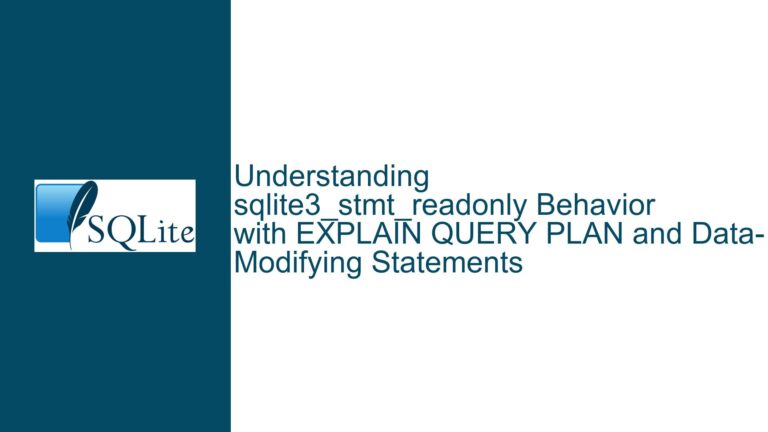Retrieving Shoppers Joined After 2020-01-01 or All Women in SQLite
Understanding the Query Logic for Date and Gender-Based Filtering
The core challenge addressed in this scenario revolves around constructing a SQLite query that retrieves shoppers meeting one of two criteria:
- All shoppers who joined the company on or after 2020-01-01.
- All shoppers identified as women, regardless of their join date.
This requires careful handling of conditional logic in the WHERE clause to ensure both criteria are satisfied without overlapping or excluding unintended records. Additionally, the original query contains structural issues related to the misuse of HAVING, improper alias formatting, and potential mishandling of NULL values in the gender column. Below, we break down the problem into its components, analyze root causes, and provide actionable solutions.
Structural Flaws and Misapplied SQL Clauses
Misuse of HAVING Instead of WHERE
The original query uses HAVING to filter rows, which is incorrect in this context. The HAVING clause is designed to filter aggregated results after a GROUP BY operation. When no GROUP BY is present, HAVING behaves similarly to WHERE but is applied after all rows are processed, leading to unintended results. For row-level filtering, WHERE is the correct clause.
Incomplete Conditional Logic for Gender and Date
The requirement to include all women irrespective of their join date and non-women (including men and NULL genders) who joined after 2020-01-01 demands precise logical operators. The initial attempt used AND instead of OR, which would exclude women who joined before 2020-01-01.
Handling of NULL Values in the gender Column
If the gender column permits NULL values, queries that check for equality (e.g., gender = 'F') will exclude NULL entries unless explicitly accounted for. The original query uses IFNULL(gender, 'Not known') to display NULL genders as "Not known," but the filtering logic must also consider NULL values when determining which rows to include.
Improper Alias Formatting
Using single quotes for column aliases (e.g., AS 'Gender') is syntactically incorrect in SQL. While SQLite tolerates this, it violates standard SQL conventions, which require aliases to be enclosed in double quotes or written without quotes.
Correcting Filter Logic and Structural Issues
Step 1: Replace HAVING with WHERE
The HAVING clause in the original query must be replaced with WHERE to filter rows before any grouping or aggregation occurs. This ensures the conditions are applied at the row level.
Original Flawed Clause:
FROM shoppers
HAVING gender = 'M' AND date_joined >= '2020-01-01'
Corrected Clause:
FROM shoppers
WHERE (gender = 'F') OR (date_joined >= '2020-01-01')
Step 2: Refine Conditional Logic to Include All Women and Recent Joiners
The logical structure of the WHERE clause must account for two distinct groups:
- Group 1: All women (
gender = 'F'), regardless ofdate_joined. - Group 2: Non-women (including
NULLgenders) who joined on or after 2020-01-01.
Incorrect Approach (Excludes NULL Genders):
WHERE (gender = 'F') OR (gender = 'M' AND date_joined >= '2020-01-01')
This excludes NULL genders from the second condition because gender = 'M' evaluates to NULL (and thus FALSE) when gender is NULL.
Corrected Logic Using IS NOT:
WHERE (gender = 'F') OR (gender IS NOT 'F' AND date_joined >= '2020-01-01')
The IS NOT operator handles NULL values correctly. For example, gender IS NOT 'F' evaluates to TRUE for NULL values, ensuring they are included in the second condition.
Step 3: Explicitly Handle NULL Values in the gender Column
If the goal is to include NULL genders in the second group (non-women who joined recently), use COALESCE or conditional checks:
Using COALESCE:
WHERE (gender = 'F') OR (COALESCE(gender, 'Other') <> 'F' AND date_joined >= '2020-01-01')
Using IS NOT:
WHERE (gender = 'F') OR (gender IS NOT 'F' AND date_joined >= '2020-01-01')
Step 4: Correct Alias Formatting
Replace single-quoted aliases with double quotes or unquoted identifiers:
Incorrect Alias:
IFNULL(gender, 'Not known') AS 'Gender'
Corrected Alias:
IFNULL(gender, 'Not known') AS Gender -- Unquoted
IFNULL(gender, 'Not known') AS "Gender" -- Double-quoted
Step 5: Validate Date Comparisons
Ensure the date_joined column is stored in a format compatible with date comparisons (e.g., YYYY-MM-DD). If stored as a string, comparisons may fail if the format is inconsistent.
Example of Ambiguous Date Format:
WHERE date_joined >= '01-01-2020' -- Problematic if dates are stored as 'YYYY-MM-DD'
Corrected Date Comparison:
WHERE date_joined >= '2020-01-01'
Final Query:
SELECT
shopper_first_name,
shopper_surname,
shopper_email_address,
IFNULL(gender, 'Not known') AS Gender,
STRFTIME('%d-%m-%Y', date_joined) AS date_joined,
STRFTIME('%Y', date('now')) - STRFTIME('%Y', date(date_of_birth)) AS Age
FROM shoppers
WHERE
(gender = 'F') OR
(gender IS NOT 'F' AND date_joined >= '2020-01-01')
ORDER BY
gender,
Age DESC;
Addressing Edge Cases and Performance Considerations
Handling Multiple Gender Values
If the gender column contains values beyond 'F', 'M', and NULL (e.g., 'NonBinary'), the IS NOT 'F' condition will include them in the second group. Adjust the logic if specific exclusions are needed.
Indexing for Performance
For large datasets, create indexes on gender and date_joined to speed up the query:
CREATE INDEX idx_shoppers_gender ON shoppers(gender);
CREATE INDEX idx_shoppers_date_joined ON shoppers(date_joined);
Calculating Age Accurately
The current age calculation (STRFTIME('%Y', date('now')) - STRFTIME('%Y', date(date_of_birth))) may produce incorrect results for individuals whose birthdays have not yet occurred in the current year. Use a more precise method:
CASE
WHEN STRFTIME('%m-%d', date('now')) >= STRFTIME('%m-%d', date_of_birth)
THEN STRFTIME('%Y', date('now')) - STRFTIME('%Y', date_of_birth)
ELSE STRFTIME('%Y', date('now')) - STRFTIME('%Y', date_of_birth) - 1
END AS Age
Testing with Sample Data
Validate the query against a dataset that includes:
- Women who joined before and after 2020-01-01.
- Men and
NULLgenders who joined before and after 2020-01-01. - Edge cases like
date_joined = '2020-01-01'.
By systematically addressing the misuse of SQL clauses, refining conditional logic, and accounting for NULL values, this approach ensures accurate and efficient retrieval of the desired records.






